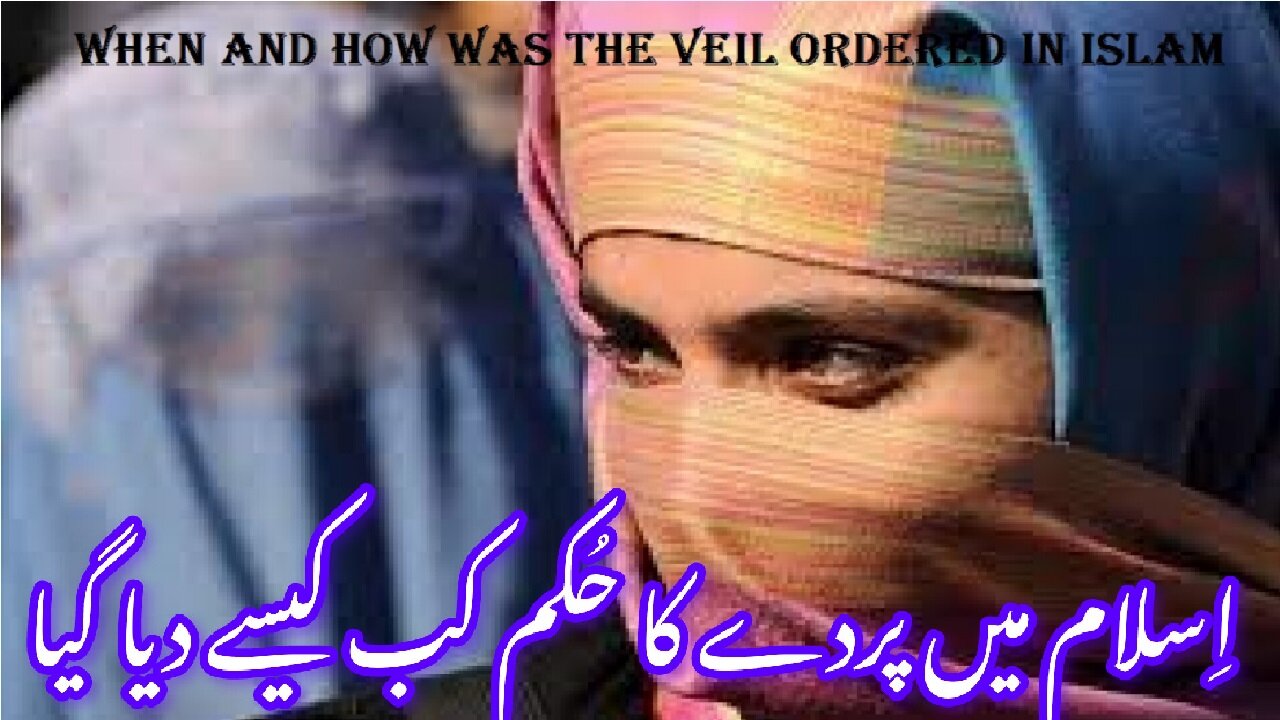Premium Only Content

When and How Was the Veil Ordered in Islam اسلام میں پردے کا حکم کب اور کیسے دیا گیا؟
@islamichistory813 #veilinislam#commandofhijab#quranicguidance
#modestyandfaith#islamicteachings#womeninislam#propheticwisdom
#surahalahzab#surahanur#spiritualmodesty#divinerevelation
#muslimwomen#islamicvalues#modestyinquran#faithandpurity
#prophetmuhammad#islamicmorality#purposeofhijab#womensdignity
#islamichistory
When and How Was the Veil Ordered in Islam?
In the name of Allah, the Most Merciful, the Most Compassionate.
Dear viewers, welcome to another informative and educational episode (instalment) in our channel series Beginning of the Light "Roshani ka Aagaz" . Today, we will describe one of the most discussed and deeply spiritual topics — *When and how was the veil ordered in Islam?* The command of the veil, or *Hijab*, is not merely a rule of dress but a divine symbol of purity, modesty, and honor. Let us travel through the verses of the Holy Quran and the sayings of Prophet Muhammad (PBUH) to understand the sacred background and wisdom behind this beautiful command.
The concept of modesty and covering oneself has existed in many civilizations and religions before Islam. However, Islam gave this concept a sacred and divine structure, linking it directly with faith, dignity, and the protection of moral society. The command for women to wear the veil, known as *Hijab*, was revealed during the later period of Prophet Muhammad’s (PBUH) life in Madinah, a time when the Muslim community had grown strong and organized.
Before the formal command of the veil, Muslim women used to wear simple garments but their style of dressing often left parts of the body visible, as was common in Arabian society. Women would go out for daily needs without specific coverings for the head or chest. With the growth of the Muslim Ummah in Madinah, Allah Almighty gradually guided the believers toward higher standards of modesty. This divine transformation took place in stages to help people accept and practice it with wisdom and ease.
The first and most direct command regarding the veil is found in **Surah Al-Ahzab (33:59)** where Allah says:
“O Prophet! Tell your wives and your daughters and the believing women to draw their cloaks over their bodies. That is more suitable that they will be recognized and not be harassed. And Allah is ever Forgiving and Merciful.”
This verse clearly shows that the veil was not only about clothing but also about dignity and protection. It distinguished believing women as people of respect and safeguarded them from harm and unwanted attention.
Another important verse comes from **Surah An-Nur (24:31)** in which Allah commands:
“And tell the believing women to lower their gaze and guard their modesty and not display their adornment except what is apparent thereof, and to draw their veils over their bosoms and not reveal their adornment except to their husbands, their fathers, their sons…”
This verse established detailed guidance for the behavior, gaze, and dress of believing women. The emphasis was not only on external appearance but also on inner modesty — a quality that beautifies the heart before it adorns the body.
When these verses were revealed, the women of Madinah responded with immediate obedience and faith. The Hadith narrated by **Aisha (may Allah be pleased with her)** in *Sahih al-Bukhari* describes this moment beautifully. She said:
“When the verse, ‘And to draw their veils over their bosoms’ was revealed, the women tore their garments and covered themselves with them.”
This shows how sincerely they embraced the command of Allah without hesitation. It was not seen as a burden but as a divine honor and a sign of closeness to their Creator.
The purpose of the veil in Islam is not to imprison women or limit their roles in society, but to uplift their dignity and safeguard their honor. The veil acts as a shield of purity and a declaration of faith. It protects women from being judged for their appearance and instead lets their character and piety shine.
Prophet Muhammad (PBUH) said:
“Modesty is a branch of faith.” (Sahih Muslim)
This Hadith shows that modesty is not limited to women alone; it is a quality of both men and women. However, the outward form of modesty for women includes the veil as a divine symbol of her devotion to Allah.
The veil also serves as spiritual protection. It reminds both men and women of their responsibilities toward maintaining purity in society. By encouraging modest behavior and dress, Islam aims to protect hearts from temptation and relationships from corruption. In *Surah Al-Ahzab (33:53)*, Allah commanded even the companions to speak to the wives of the Prophet (PBUH) from behind a curtain, saying:
“That is purer for your hearts and for their hearts.”
This demonstrates that the veil protects not only women’s modesty but also purifies the intentions of men, creating a spiritually clean environment within the community.
The order of the veil was not revealed all at once but came gradually, showing Allah’s mercy and understanding of human nature. Islam often introduced important changes step by step, allowing believers time to adapt both mentally and socially. Just as the prohibition of alcohol came in stages, the command of modest dress also unfolded gradually, reflecting divine wisdom in shaping a moral and disciplined society.
Today, the veil continues to symbolize faith, identity, and strength. For many Muslim women around the world, it is a conscious choice to live according to the teachings of Allah. The veil connects them spiritually with the noble women of Islam — such as Khadijah, Aisha, and Fatimah (may Allah be pleased with them). Despite modern challenges, the Hijab remains a timeless expression of devotion and respect.
Dear viewers, the command of the veil was not just a rule but a message of honor, respect, and faith from Allah Almighty. It came at a time when Islam sought to purify hearts and build a modest, moral society. The Hijab continues to be a symbol of devotion and inner beauty, connecting believers to the noble women of the past. Let us remember that true modesty begins in the heart and shines through our actions, words, and appearance. May Allah grant us wisdom to follow His commands with love and sincerity.
Thanks for watching. May peace be upon you all.
Allah Hafiz
======================
-
 1:30
1:30
ISLAMIC HISTORY
13 hours agoSurah Yunus with English Urdu Translation Verse 17 سورہ يُوْنُس انگریزی اردو ترجمہ کے ساتھ آیت نمبر
6 -
 32:24
32:24
Forrest Galante
12 hours agoHunting and Eating The World's WORST Fish (Everglades At Night)
104K7 -
 32:10
32:10
Nikko Ortiz
17 hours agoSecret Agent Infiltrates Neo-Nazis...
20.4K16 -
 15:04
15:04
MetatronGaming
1 day agoOriginal Commodore 64 VS C64 Maxi - Review and Comparison
26.9K9 -
 9:46
9:46
MattMorseTV
16 hours ago $21.20 earnedTrump just SHUT DOWN a $287,000,000 FRAUD RING.
30.4K88 -
 15:48
15:48
GritsGG
18 hours agoWinning a Rare Solos Prison End Game on Warzone!
22.8K3 -
 11:37
11:37
The Pascal Show
18 hours ago $7.52 earnedTHEY WANT TO END HER?! Candace Owens Claims French President & First Lady Put A H*t Out On Her?!
25.1K26 -
 LIVE
LIVE
Lofi Girl
2 years agoSynthwave Radio 🌌 - beats to chill/game to
519 watching -
 24:30
24:30
DeVory Darkins
19 hours agoMarjorie Taylor Greene RESIGNS as Minnesota dealt MAJOR BLOW after fraud scheme exposed
86.4K130 -
 2:19:48
2:19:48
Badlands Media
1 day agoDevolution Power Hour Ep. 409: Panic in the Narrative — Epstein, Israel, and the Manufactured Meltdowns
181K73